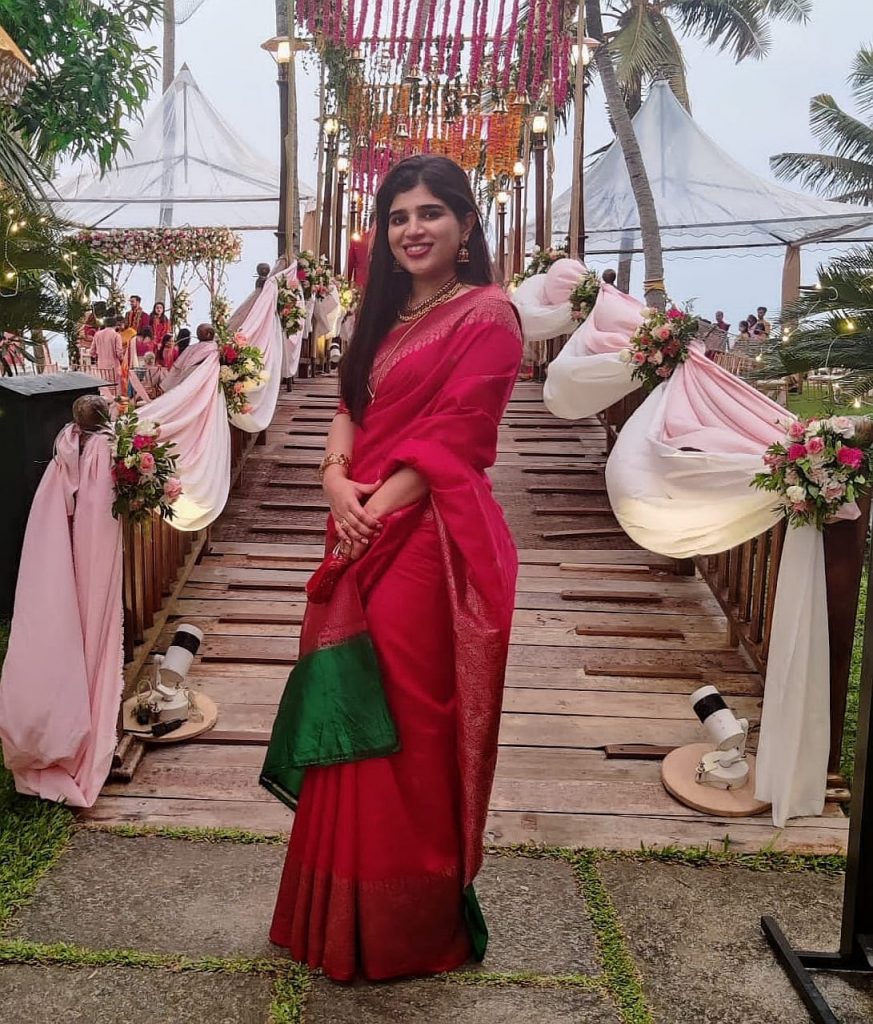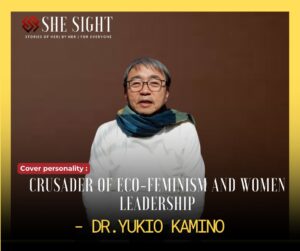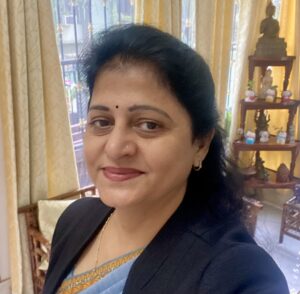Rouble Nagi: Transforming Minds, One Slum at a Time

“Advocacy is good, but only advocacy is not enough. So this is what we wanted to do but through art. Because art brings people together and connects you to people very easily. People start trusting you and understanding that you are there to give and not to take, which they are not used to. You need to approach them with a lot of love, understanding, and care. Explain to them why you are there. That you just want a cup of tea, a samosa, and a hug!”
Artist, sculptor, painter, philanthropist. She is all this and much more. A humanitarian at heart, she defines her success as the love and relationships she has accumulated over the years as a social worker. The daughter of an army officer, she found her creative spirit at a young age and curated it into something that not only flourished within the art world but turned it into something that benefits society at large. Born in Jammu & Kashmir, she completed her undergraduate studies in political science and later studied fine art at the Slade School of Fine Art in London. She continued to study European Art at Sotheby’s London.
The Rouble Nagi Art Foundation (RNAF), established over a decade ago, aims to bring about systemic and sustainable social change in the lives of women and children through art.
“Art is a beautiful medium to break that barrier between people”, she says. RNAF uses art workshops, and community art projects to reach out and establish relationships, enabling them to change minds and lives.
Why Art? Why did you choose art as your discipline?
I would say I was born as an artist. Someone who was born with a lot of creativity. I always had a curious mind. I still have a very curious mind. When I see something unique or something that is not normal in my mind, I will reach out to that place or I will reach out to that person and just converse with or feel it. Just to find out what it is. It’s just as curiosity in a child makes them do things.
I suppose being born in an army officer’s house, we traveled every two, two and half years to a new city, a new village, a new state with my father. India is a big country. Every state has something unique, something so beautiful to offer. They wear different clothes, eat different food, speak a different language, they have a different culture to follow altogether. So I think that in itself was so fascinating to me growing up. When I went from Karnataka to Kolkata, and then Punjab, Kashmir, Telangana, and Kerala. It was so much for my brain to take! It was like constantly feeding into a computer. There was just so much beauty, so much creativity and so many things around us. So how can I put shape to it? That was the question in my mind. Somewhere down the line when I was going to school, (I studied in army schools and Kendra Vidyalaya, which is where most army kids study, because they’re present in every state), I think that was always sticking in my mind. And traveling and meeting different people and seeing new sights was always so interesting to me. So I guess that’s where the creativity and Rouble Nagi as an artist and sculptor came about, this feeling of I must do it.
But coming from a fauji (Army) background, you have set careers, set by your parents. You either become a doctor an engineer or a teacher. So you study, get a government job and your life is set. But I think once they saw this creativity in me, they were content in giving these options to my brothers while I was given the freedom to choose. That was very helpful. When my father was posted to Kolkata, I had my first trip to Shantiniketan. That’s where my art journey actually and professionally began. I was in the 11th standard, and I went there with my father I remember asking him, can you please leave me here and go, just let me be here! I asked him if I could live there. He of course told me that I had to finish my schooling. I have been back many times over the years, that is where my true inspiration to become an artist came from. I recognized that inner artist there.
I went on to complete my graduation and came back to Bombay because I got married at a very young age, 18-19. I studied art and completed my political science graduation, all after marriage. That’s where my art journey began but as years passed by and I grew older, and began taking on commission works, I had this realization that my art would bring me closer to people. Because that’s what my aim was. My aim wasn’t to do exhibitions and auction art, it was how I use art, reduce the commercial side, and be of service to people.
RNAF has taken on many projects over the years. Their projects work in areas of education, women and youth empowerment, skill and vocational training, hygiene, and sanitation. But perhaps what has been their most successful venture was the Misaal Mumbai project. A slum beautification and transformation project that had, as its aim, all of the above areas.
Misaal Mumbai started in 2016 with Dharavi and now it exists in over 16 states. What was your inspiration behind that initiative?
We started Paint Dharavi in 2016. The Rouble Nagi Art Foundation launches different initiatives every one or two years depending on the length of that initiative. We did Raunak, we did Learn to Earn, Skill India, and many more. With Paint Dharavi, we decided that we would work with certain parts of Dharavi, as we already had a presence in those slums for a long time. We said, let’s start with beautification, street art, and some fun activities in the slum. So that’s what we did. Two years down the line, I was crossing the sea link, and I would visualize these colorful huts and I would feel happy. However, the main goal was not just beautification, it wasn’t about coloring and painting the hill. Something beyond that needed to be done.
One day, I went to meet a few students inside Jaffar Baba, the slum. I had always only seen it from the outside, seen it from an artist’s perspective. Now on the inside, I was looking at it from a social worker’s point of view. And I started thinking about what needed to be addressed. The toilets were dirty, not every home had access to toilets, the streets were dirty, and a lot of children were not going to school. It was why I had started working in slums in the first place. So I did my reiki, spoke to some of the common friends that we had who were a part of the Bandra constituency, and told them what I wanted to do. They were keen on it as well. In two days I had my team together. We picked up our paint and our buckets and we walked into the slum. And that’s where Misaal Mumbai was launched. We launched in Mumbai because that’s where I lived and that’s where we worked. But the main aim of Misaal Mumbai was not coloring the walls. We start with beautification, we start with painting and art because art is a beautiful medium to break that barrier between people.
When we go up to people and say, we want to send your kids to school or We want you to send your women to our skill centers, they say “Madam, what are you saying? How will we manage it?” So we don’t do that. With every initiative of ours, for the first 10%, we go in with our colors. Let’s play with colors, let’s have fun together. When we painted 20 huts, we had 200 people standing behind us. Out of curiosity, to see what is going on. A lot of people came to ask “Are you tearing down the houses? Are you marking the houses with different colors? Is there a politician involved? Is there a builder involved? Are we about to become homeless?” Some asked whether it was a film shooting! And that is where we step in. Here we address them and explain what we are there to do. We say, come to be a part of this, and everyone joins in. People get involved and have a sense of community. They start giving us ideas, asking, “Shall we paint this house this color.” One lady came up to us and said, her daughter was getting married in October so could we please paint her house pink? So people’s involvement was very important. See, colors fade, but the change we bring about in people’s minds stays forever. And that was our aim.
The change in question was 100% children going to school, cleanliness, and reduced plastic use. Cleaner toilets and waste management. We did workshops with people to help them with this. Women empowerment was our other goal.
When are women empowered? Women are empowered when they can stand on their own two feet. Self-belief doesn’t happen just by talking about it. It can only happen when our women can stand on their own financially. When they have their own money in their bank. Advocacy is good, but advocacy is not enough. So this is what we wanted to do but through art. As I said, art brings people together and connects you to people very easily. People start trusting you and understanding that you are there to give and not to take, which they are not used to. You need to approach them with a lot of love, understanding, and care. Explain to them why you are there, that you just want a cup of tea, a samosa, and a hug!
Our big Missal India family is built on trust and the work we have done on the ground. So that is how Missal Mumbai came into origin. Paint Dharavi was about beautification but Missal Mumbai was about total holistic growth. Less than a year later we started getting tagged on SM, people started transforming their villages and tagged us as their inspiration and we went pan India. We have had inquiries internationally as well from Sri Lanka, Bangladesh, and Spain. But India is a big country and I first want to cover India. And that’s how we went from Misaal Mumbai to Misaal India.
I’m sure this wasn’t an easy project or initiative. What were the biggest challenges you faced? Were they social, were they political?
I think challenges are very much a part of everyone’s lives. Especially when you’re working in slums when you’re working in villages. Where some areas are completely new to me. In some areas, we may have a network, of friends, and colleagues that we know that we can reach out to and ask for help in introducing us to the area. But in others, we are completely new. When you are entering such an area, you have plenty of challenges. Even in situations where we’ve had someone to introduce us, the challenges persist, because, at the end of the day, we are the ones that need to do the work on the ground. We are the ones who need to interact with people and address their issues. Because when you go into a slum, it’s not just a few issues. So you can’t walk in and say, this is my scope of work and that’s it. Your scope of work takes a back seat when you’re there with people. If I see a child unwell, I am not going to say, that’s not my scope of work. We are not in healthcare so I’m not going to address it.
For example, when we were working near the airport in Bombay, there was a lady. A mother was in front of her gate, and it was just complete garbage. She had in her hand a child, without clothes, who was covered in a skin allergy. She sees me because I’m on the ground every day, she’s standing next to me and talking to me. I love children, everything I do is because I love children. So naturally, I reached out and took this child in my arms. I looked the child over and saw all the rashes, and I told the mother, all these rashes are not good, you need to see the doctor. The mother was so touched that I reached out and held the child. For me, they are my family.
We decided to do a health camp, free for all with pediatrics and gynecology. We were talking about this to a group of these women that had gathered around us and suddenly a group of men came and started dispersing us. “Stop this work, stop what you’re doing, etc”. “We saw your photo with some politician on the poster”. They were claiming that only one particular party was allowed to work there. So you have to be involved in that party etc. They were making a ruckus. My team also got involved and asked me to back down. But I refused to be bullied when we were there to do good work. And you won’t believe, all of these women, these mothers got together. In slums, all these houses are connected, you hardly need to yell to get someone’s attention. They gathered everyone and started telling the guys off! Saying, how dare you talk to her like that? You were elected as secretary of this area and neither are you doing the work nor will you let someone else do the work! I was scared that there would be a big fight! I then intervened and made some peace. I told them to come back the next day and we can talk in peace. He came back the next day, apologized, and we spoke. He then joined us, along with a number of his team. He still works with us!
So yes slums are full of challenges. In some villages, I remember they said, “We won’t take instructions from women. Why should we listen to you?” But if you sit down and speak to them calmly and with understanding, they will also understand. You need to have a lot of patience. You need to be calm and listen to them. In an interview, a journalist from Bangalore asked me, “Ma’am slums are dark, dangerous, and dingy, how do you manage?” And I said that’s not how I would describe slums. The way I see it, people are living there. There are good and bad in the biggest communities as well. You need to see the good. Because there is good in every person. I have had amazing nights and days with these communities. Their condition is not great, but that’s why we are there. We have to have an open mind and realize that we are there to help them.
Challenges are a part of life, it depends on how you approach your work.
We create a sense of community. We appoint leaders for each street and give them the responsibility. Start and continue workshops, and open skill centers. It’s all about sustainability.
How successful has Misaal Mumbai been? Especially when we speak of women’s empowerment.
It’s been great. As I said we don’t believe in just advocacy. For example, when I was in Rajasthan, we would go to all of these homes, one after another. And everywhere I would be given little plastic cups of coke or juice. One use and throw plastic cups. Everyone was giving me plastic. I was waiting for that steel or glass cup but that was only 10% of the time. So the next day, I called for a women’s workshop to open a skill center. Because opening one is well and good, but do the women want to come? Do they want to learn? That’s also important. What are they going to learn? What are they going to make?
So there at the workshop, I asked them, why did you give me plastic cups? Why not glass or steel? And they said, “It’s convenient, we can just throw it”. So I said, but do you know how much waste that creates? It goes into the stream, into our water. And one of the women, she’s older, around 60 years old. We call her ‘Kaki’, she said, “we don’t have fancy technology. We don’t have YouTube. We don’t see the news. Everyone tells us not to use plastic but they never tell us what to use instead. We won’t do anything bad for us either! But we need the information, we need to be told”.
So that’s how we got a team together, went door to door, and spoke to people about reducing their plastic consumption. And now, in that village, 85% of their consumption is from non-plastic products. Which is way more than we were hoping for. You will not see a single plastic wrapper on the ground. This is the difference we’ve managed to make in one year. With advocacy, you also need to communicate on the ground.
So this was the impact of Misaal. Where in every slum we went to, the area where we were working, 100% of the children went to school. Women who want to work and earn can come and learn in our centers. Workshops for sanitation, and waste management. We are replicating this model in various states as well. So complete holistic change. That’s how you sustain a model like this and that’s how you see successful change.
You’ve come a long way from realizing your passion and then transitioning that into philanthropy, do you have any advice for the youth?
I interact with so many youngsters. Our team is very young. And I always tell them one thing, don’t be scared. I know we have a lot of things we want to do in life, so take that chance. Success or failure doesn’t matter, but you need to take that chance. Unless you do you won’t know whether you will succeed or fail. You never want to have regrets. Give your best, and be fearless. I see youngsters being impatient, they want things overnight. Rome wasn’t built in a day. You need to work hard to get there, and then you need to work hard to sustain it.
No matter what your background is, you need to work for it. Success is defined differently for different people. For me, success is how the youngsters in my team have grown. Joining the army, writing IPS and IAS exams. That’s success for me. Don’t be disheartened when things are not moving as fast as you want them to. Just have patience.
What are you working on at the moment? What is the future of the Rouble Nagi Foundation?
We are working on a lot of projects! Covid has been very hectic for us. Our work is in the slums, and villages where cases were rising. We locked down all our areas and back-to-back supplies of rations. The first wave was completely different from the second wave. In the first wave, there was a need for rations and essentials. In the first wave, no one was sure of what to do. And they talk of social distancing, but these are slums! How can we hope to social distance? So we sealed the areas. No one in or out, we will provide everything from the local ration shops. One advantage we had was that the members of our team, who work in the slums, are from there.
The second wave was completely different, the need was completely different. We started a childcare center. Which was a different direction for us. This was a center for children to stay in, through the night. Because these were the children, whose parents had both tested positive for covid. Who had nowhere else to go? We converted around 8 or 9 of our centers into these daycare centers. Where these children will come, live, and learn with us. We ran it like a boarding school, with a routine, keeping them occupied. Because these children were mentally traumatized, thinking their parents were either dead or dying.
Covid has kept us on our toes. Recently we did the hygiene kit distribution drive with the Delhi police. Explaining to people that COVID is still not over. You still need to be careful.
The readership for our magazine is overwhelmingly women, and more specifically women who are looking to come back to the workforce. What advice do you have for them?
Being a housewife is great, but if you want to do something else. It doesn’t matter what age you are or where in your life you are. The day you decide to do it, go for it. Just start. First, sit and decide what you want to do and pick that one thing you want to do. Things are different today, it’s the 21st century. Everything is available at the click of a button, so what is it that you can’t do? We have 50- 60 year old women in our skill centers! I sometimes make fun of them, “Kaki what are you going to do earning at this age?!” They say, “We will learn and we’ll buy toys and things for our grandchildren!”
What is stopping you? Make your circumstances work for you. It’s not gonna come easy but just start. Forget what you haven’t done, focus on what you can do, what you want to do. Just go for it!
Rouble Nagi and the Rouble Nagi Art Foundation are prime examples of how you should just hunker down and do the work. If you’re looking for excuses, there will be plenty. Instead, just focus on the work that needs to be done, and do it. RNAF has come a long way in the last decade, they have affected and improved the lives of thousands, and they are still doing the work. A true inspiration!
Written By-

Associate Editor









